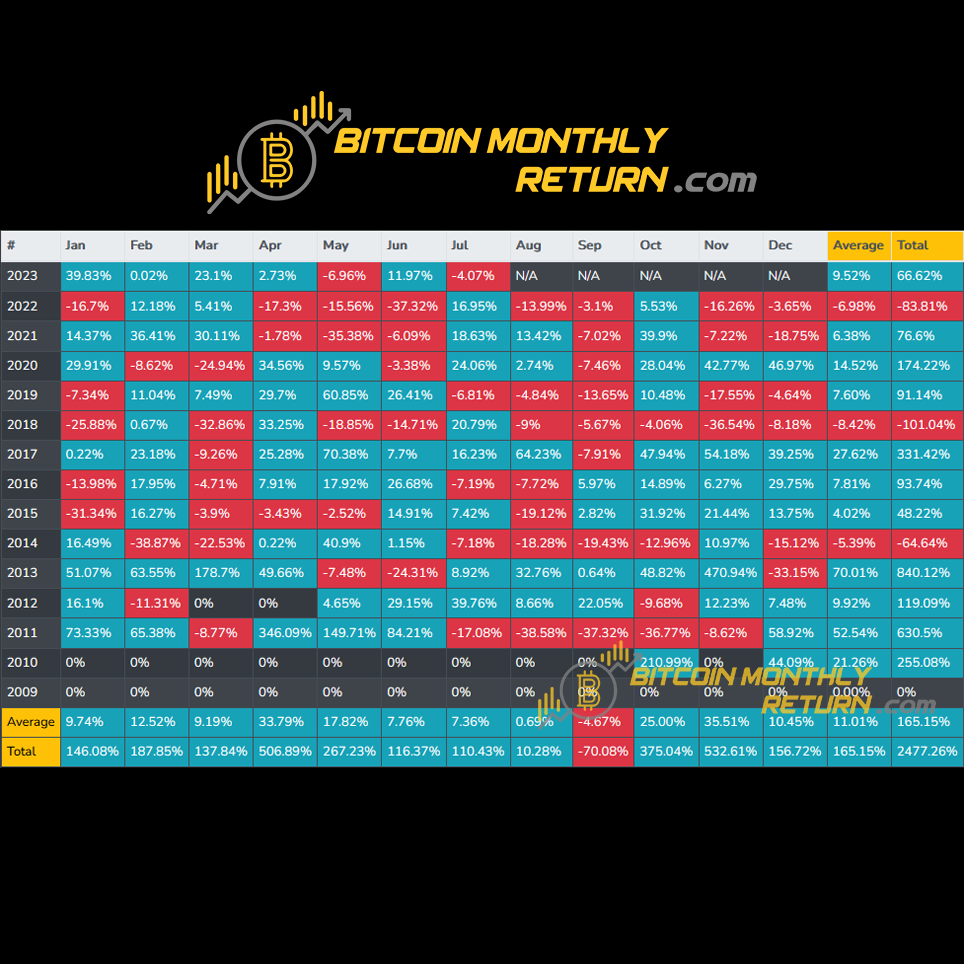News - Why a new Bitcoin sell-off is imminent in September
Statistically, September is the worst month for Bitcoin. What causes the September effect?
It is now official: the August closing price for Bitcoin is $25,932 (USD). This means the cryptocurrency is printing a double-digit price loss on Tableau after a good start in 2023 at 11 percent.
But is this just the beginning? Looking at the historically poor performance in the month of September, one has to argue: There is little chance of a trend reversal. After all, risky assets like tech stocks or Bitcoin performed worse in September than in any other month - at least, that's the story.
But is that really true? And how should investors behave now?
In fact, the data paint a clear picture: In no other month does BTC perform as lousy as it did in September. According to bitcoinmonthlyreturn the No. 1 cryptocurrency has lost an average of 4.67 percent since its inception in 2009. At its peak, Bitcoin even lost more than 37 percent of its value within a single month. Granted: This low point was reached in 2011, so in the cryptocurrency's volatile early days.
Yet digital gold has printed a green mark for its monthly performance in only four of the 12 September months in Bitcoin's history. This is in line with the overall negative trend in risky assets.
The so-called September effect is notorious among stockbrokers. In the past 100 years, no stock market month has performed worse. On average, stock prices of the S&P 500 lose about 1 percent in the first month of autumn. What is the reason for this?
Where does the September effect come from?
There are a number of causal explanations for the September effect. On the one hand, market observers assume that investors will return to the stock market after their summer vacation - and book losses. After all, these can be claimed at the end of the fiscal year. Moreover, debt money accounts will become due, leading to further selling.
But more likely there is a psychological connection. The September effect has become such a well-established phenomenon that investors are already liquidating securities in anticipation of the September effect.
This start of the month actually honors the September effect. At the start of the new calendar month, BTC is down 4.6 percent from the previous day. At the time of writing, the cryptocurrency is trading at US$25,960.
Exceptions confirm the rule
Still, market observers such as Samir Kerbage, CIO at Hashdex, are optimistic.
Although September has historically been a difficult month for Bitcoin, with negative returns in nine of the last 12 cases, September 2023 could be an exception to this trend. Recent legal developments at the U.S. Securities and Exchange Commission (SEC) - such as Blackrock's ETF filing in late June and the recent positive ruling for Grayscale - have given the market new momentum.
On the other hand, hopes for quick approval of a Bitcoin Spot ETF have been dampened by new proposals from the SEC. The responsible regulator, the SEC, has postponed the deadline for a decision until mid-October.
Still, the omens for Bitcoin are not so bad. Recently, a U.S. appeals court rules in favor of Grayscale. The company also wants to convert its GBTC Bitcoin Trust into an ETF. The SEC should not have simply rejected this, the judge ruled.
"The ruling brings movement to the Bitcoin ETF approval discussion and we believe this, along with new applications, will take the regulatory discussion to the next stage," Kerbage stated in an interview with news platform BTC-ECHO.
Disclaimer: Ultimately, the September effect is a statistical anomaly. Past results should not be a basis for predictions.







